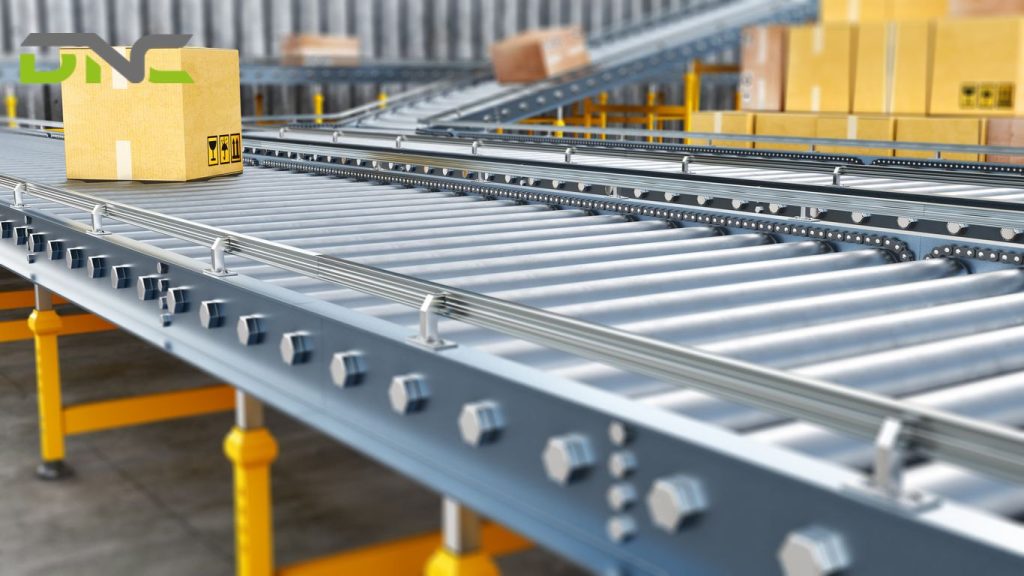Warehouse Conveyor Systems: Types, Benefits, Costs, and Trusted Providers
What are the warehouse conveyor systems? Warehouse conveyor systems are automated material handling solutions designed to transport goods within a warehouse environment. These systems eliminate the need for manual handling, allowing items to move quickly and efficiently from one point to another. Often used in logistics centers, e-commerce fulfillment centers, and manufacturing plants, conveyor systems support higher throughput while reducing labor costs and inefficiencies.
By integrating conveyors into the warehouse, they create streamlined workflows that minimize human error, expedite order processing, and optimize space utilization. As businesses grow in size and demand faster fulfillment, warehouse conveyor systems have become an essential tool for maintaining productivity and improving operational efficiency.
What types of conveyors are used in warehouses?
There is a wide variety of conveyor models available on the market today to suit different needs and capacities. Some of the most popular and widely used types on the market are: Belt conveyors, roller conveyors, bucket conveyors, etc.
Belt conveyors

Belt conveyors
Belt conveyors are one of the most common and versatile types used in warehouses. This system consists of a continuous belt that is stretched over rollers or pulleys to move items along a defined path. Conveyors can be made from materials such as rubber, PVC, or fabric.
This type of conveyor is ideal for transporting small to medium-sized items, especially packages that do not have a flat base. Belt conveyors are often found in packaging areas, sorting lines, and assembly stations. They operate smoothly and quietly, require minimal maintenance, and are highly customizable in length, speed, and incline.
Roller Conveyors

Roller Conveyors
Roller conveyors use a series of cylindrical rollers to move products. They come in two main forms: gravity rollers, which rely on gradients and gravity, and motorized rollers, which use motors to move automatically.
Gravity roller conveyors are simple, cost-effective, and great for short-distance or dock-based transfers. Powered roller conveyors, on the other hand, offer better speed and direction control and are ideal for continuous flow systems or accumulation areas. These conveyors are perfect for moving boxed goods, pallets, and flat-bottomed containers.
Overhead Conveyors

Overhead Conveyors
Overhead conveyors are ceiling-mounted systems where items are suspended and moved by trolleys along rails. They are commonly used in industries such as garment manufacturing, automotive, and paint booths, where floor space needs to be kept clear.
Overhead conveyors are a smart choice for warehouses with limited floor space or specialized processes such as drying, curing, or hanging. They provide efficient vertical material flow and can transport items over long distances or multiple floors.
Bucket Conveyors
Bucket conveyors consist of buckets attached to rotating belts or chains, designed to scoop and lift materials vertically. They are primarily used for bulk handling in facilities that handle grain, fertilizer, chemicals, or food products.
The enclosed design of these conveyor systems helps prevent spills and protects products from contamination. Bucket elevators are ideal when vertical lifting is required in a small space,s and they provide gentle, consistent handling of fragile materials.
How does an industrial conveyor in a warehouse work?

How does an industrial conveyor in a warehouse work
The way a conveyor system operates depends on its design, but most systems follow a basic process:
- Loading: Goods are placed on the conveyor at entry points, which can be manual, semi-automatic, or fully automated with pickers or robots.
- Moving: Items are transported along the conveyor path via conveyors, rollers, or air pressure, depending on the type.
- Sorting and directional flow: Modern conveyors integrate sensors, barcode scanners, or RFID readers that detect products and send them to the appropriate destination.
- Unloading: Products are unloaded at designated areas for packaging, shipping, or further processing. In some cases, robotic arms or diverters automate this step.
- Advanced systems often integrate with warehouse management software (WMS) to optimize routes, track performance, and adjust speed or direction in real time. This makes the entire operation more dynamic and responsive to changing needs.
How much does it cost to install a warehouse conveyor system?
Many people often wonder whether the cost of installing a warehouse conveyor system is expensive or cheap. This question is difficult to answer because the price of conveyors depends on and varies according to several factors:
- Length and layout: Straight conveyors are often cheaper than conveyors with curves, slopes, or multiple transfer points.
- Customization and add-ons: Adding a barcode reader, diverter, or control system will increase the cost.
- Labor and installation: Depending on the complexity, professional installation costs can range from $5,000 to more than $50,000.
- Ongoing maintenance: Annual maintenance costs typically range from 5% to 10% of the initial investment.
In general, a small warehouse can expect to spend $10,000–$50,000, while a large facility can expect to spend upwards of $400,000 for a fully integrated system. However, these costs are often offset by improved productivity and much lower labor costs.
Which companies provide the most prestigious signal conveyor system?
If you are looking for a reliable supplier of high-quality warehouse conveyor systems in Malaysia, DNC Automation is a standout choice. With over 15 years of experience in the field of industrial automation, engineering, and technology, DNC has built a solid reputation for providing reliable and fully customized conveyor system solutions that suit the needs of businesses across a wide range of industries.
- Custom WMS solutions for warehouses of all sizes and industry requirements
- Seamless integration with Automated Storage and Retrieval Systems (ASRS) and other material handling equipment
- Real-time inventory tracking, order processing, and warehouse performance analytics
- Industry 4.0 and IIoT capabilities for data-driven warehouse operations
- Complete project management from system design and software implementation to training and technical support
Contact us now at the hotline below, we are ready to serve you!
- 14 views
- 0 Comment




Recent Comments